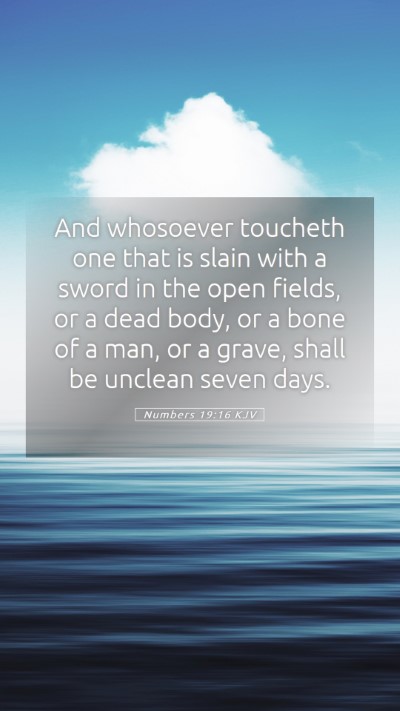Bible Verse Meaning: Numbers 19:16
Understanding the Verse: Numbers 19:16 states, "And whosoever touches one that is slain with a sword in the open fields, or a dead body, or a bone of a man, or a grave, shall be unclean seven days." This verse outlines specific regulations regarding purity laws in ancient Israel. The context of the verse is crucial for a deeper understanding of its implications and applications.
Bible Verse Explanations
This verse highlights the theme of ritual uncleanness associated with death. Touching a dead body or coming into contact with items related to death resulted in ceremonial uncleanliness, necessitating a period of purification. This reflected the Israelites' understanding of life and death, emphasizing cleanliness and holiness before God.
Scripture Analysis
- Symbolism of Death: Matthew Henry emphasizes that death represents the consequence of sin. Therefore, this statute serves as a reminder of the seriousness of sin and its pervasive effects.
- God’s Holiness: Adam Clarke notes the importance of maintaining purity in the community, illustrating God's holiness. The laws served to separate the sacred from the profane.
- Cultural Context: Albert Barnes elaborates on the cultural implications, pointing out that these laws were intended to instill a sense of awareness regarding the sanctity of life and the reality of mortality.
Bible Study Insights
This verse provides important Bible study insights regarding how ancient Israel viewed death and uncleanness. It encourages modern readers to reflect on the significance of spiritual cleanliness and moral integrity, paralleling it to New Testament teachings where Jesus emphasizes inner purity over ritualistic adherence.
Related Themes
- Purification Rituals: The laws concerning uncleanness had direct implications on daily life and worship, initiating considerations about spiritual and moral purity.
- Death and Sin: The connection between death and sin is profound in Biblical theology. This verse connects to broader themes of redemption, where Jesus’ death brings purification from sin.
- Community Cohesion: The regulations were not merely personal but were designed to maintain community purity, fostering a sense of collective responsibility towards holiness.
Importance of Understanding Scripture
Understanding this verse allows for a more nuanced perspective of Bible verse interpretations. It serves both as a historical account and a theological principle that can be applied to contemporary life.
Practical Applications
Applying the principles found in Numbers 19:16 to daily life may involve examining personal behaviors and their impacts on spiritual cleanliness. It encourages individuals to actively seek ways to maintain purity in thoughts and actions, even in the face of mortality.
Additional Bible Cross References
- Lamentations 3:15: Touching upon the bitterness of death and its consequences.
- Leviticus 11:24-25: Discussing laws of uncleanness associated with dead animals.
- Hebrews 9:14: Connecting the idea of blood and purification to the sacrifice of Christ.
Conclusion
In summary, Numbers 19:16 not only outlines a specific law but also reflects broader theological themes regarding sin, death, and purification. Understanding this verse through Bible commentary and rigorous Biblical exegesis enhances our knowledge of Scripture and its application to life today.


